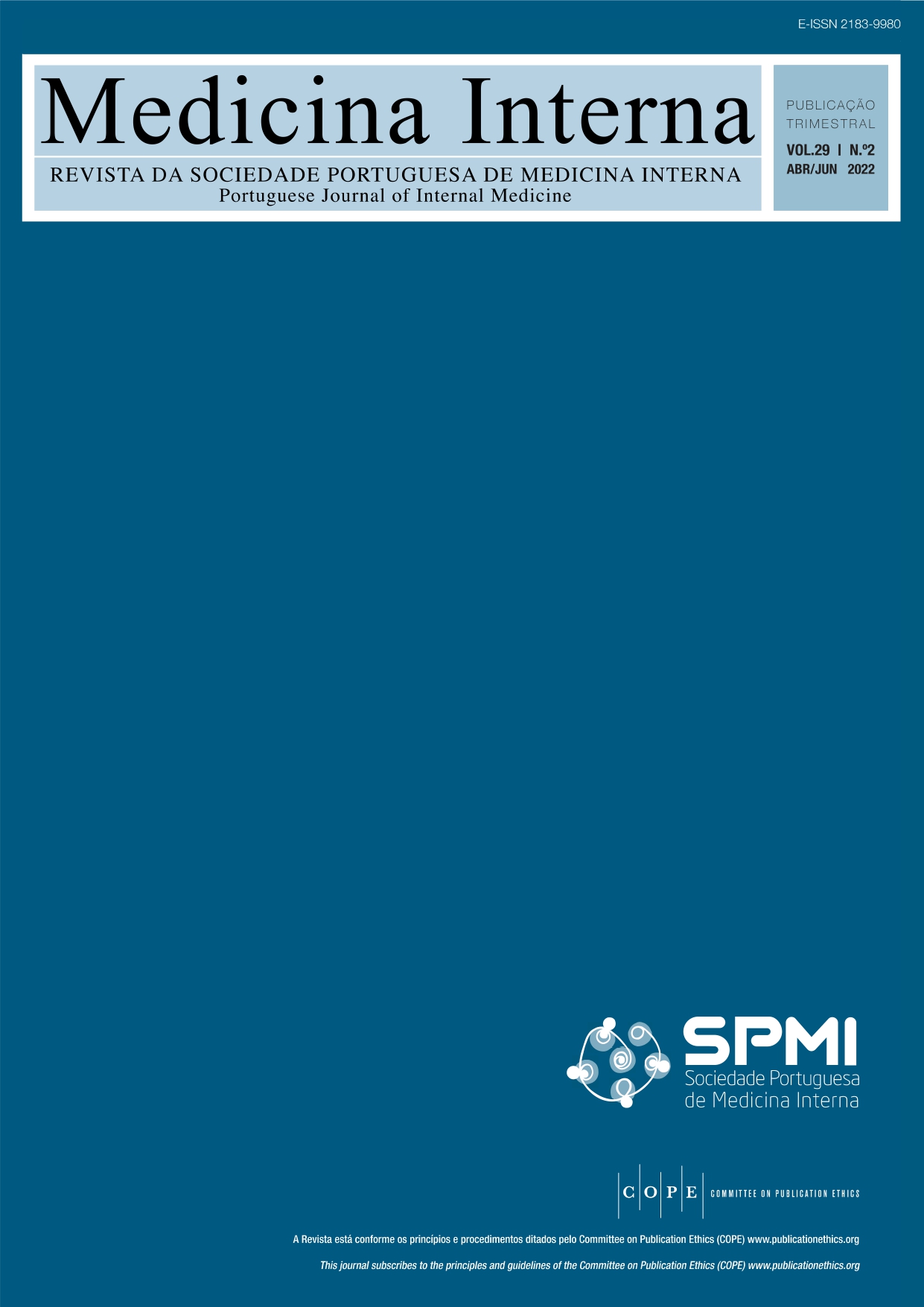Cytokine Release Syndrome in Oncologic Patients Treated with CAR-T
DOI:
https://doi.org/10.24950/rspmi.287Keywords:
Cytokine Release Syndrome/drug therapy;, Receptors, Antigen, T-Cell, Receptors, Chimeric AntigenAbstract
The field of immunotherapy and its exponential growth as
a therapeutic option against cancer, in particular through the novel therapy using chimeric antigen receptor T (CAR-T), unravels the need to expand knowledge related to its toxicities. Cytokine release syndrome and the neurotoxicity associated with CAR-T therapy are the two most frequent conditions and are not only potentially fatal but also difficult to diagnose, since they can mimic other diseases, such as sepsis. The aim of this review was to characterize cytokine release syndrome in oncologic patients treated with CAR-T therapy, mainly focusing on its clinical manifestations and therapeutic management.
Downloads
References
Shimabukuro-Vornhagen A, Gödel P, Subklewe M, Stemmler HJ, Schlößer HA, Schlaak M, et al. Cytokine release syndrome. J Immunother Cancer. 2018;6:56. doi: 10.1186/s40425-018-0343-9.
Murthy H, Iqbal M, Chavez JC, Kharfan-Dabaja MA. Cytokine Release Syndrome: Current Perspectives. ImmunoTargets Ther. 2019; 8:43–52.
Cosenza M, Sacchi S, Pozzi S. Cytokine release syndrome associated with T-cell-based therapies for hematological malignancies: Pathophysiology, clinical presentation, and treatment. Int J Mol Sci. 2021;22:7652. doi: 10.3390/ijms22147652. .
Kennedy LB, Salama AKS. A review of cancer immunotherapy toxicity. CA Cancer J Clin. ; 2020;70:86–104.
Liu D, Zhao J. Cytokine release syndrome: grading, modeling, and new therapy. J Hematol Oncol. 2018;11:121. doi: 10.1186/s13045-018-0653-x.
Lee DW, Santomasso BD, Locke FL, Ghobadi A, Turtle CJ, Brudno JN, et al. ASTCT Consensus Grading for Cytokine Release Syndrome and Neurologic Toxicity Associated with Immune Effector Cells. Biol Blood Marrow Transplant. 2019;25:625-38. doi: 10.1016/j.bbmt.2018.12.758.
Frey N, Porter D. Cytokine Release Syndrome with Chimeric Antigen Receptor T Cell Therapy. Biol Blood Marrow Transplant. 2019;25:e123-e127. doi: 10.1016/j.bbmt.2018.12.756. E
Lee DW, Kochenderfer JN, Stetler-Stevenson M, Cui YK, Delbrook C, Feldman SA, et al. T cells expressing CD19 chimeric antigen receptors for acute lymphoblastic leukaemia in children and young adults: A phase 1 dose-escalation trial. Lancet. Lancet . 2015;385:517–28.
Brudno JN, Kochenderfer JN. Recent advances in CAR T-cell toxicity: Mechanisms, manifestations and management. Blood Rev. 2019;34:45-55. doi: 10.1016/j.blre.2018.11.002.
Shin YH, Tian X, Park JJ, Kim GY, Aboujaoude E, Sturgill MG. Management of chimeric antigen receptor T-cell induced cytokine release syndrome: Current and emerging approaches. J Oncol Pharm Pract. 2022;28:159-74. doi: 10.1177/10781552211039238.
Yescarta | European Medicines Agency [Internet]. [consultado a 9 Dez 2021]. Disponivel em: https://www.ema.europa.eu/en/medicines/human/EPAR/yescarta
Kymriah | European Medicines Agency [Internet]. [consultado a 9 Dez 2021]. Disponivel em: https://www.ema.europa.eu/en/medicines/human/EPAR/kymriah
Brudno JN, Kochenderfer JN. Toxicities of chimeric antigen receptor T cells: Recognition and management. Blood. 2016;127:3321-30. doi: 10.1182/blood-2016-04-703751.
Bahadur G, Ozturk O, Muneer A, Wafa R, Ashraf A, Jaman N, et al. Semen quality before and after gonadotoxic treatment. Hum Reprod. 2005;20:774–81.
Fajgenbaum DC, June CH. Cytokine Storm. N Engl J Med. 2020;383:2255-73. doi: 10.1056/NEJMra2026131.
Morris EC, Neelapu SS, Giavridis T, Sadelain M. Cytokine release syndrome and associated neurotoxicity in cancer immunotherapy. Nat Rev Immunol. 2022;22:85–96.
Common Terminology Criteria for Adverse Events (CTCAE) [Internet]. National Cancer Institute - Division of Cancer Treatment & Diagnosis. [consultado a 10 Dez 2021]. Disponivel em: https://ctep.cancer.gov/protocoldevelopment/electronic_applications/ctc.htm
Park JH, Rivière I, Gonen M, Wang X, Sénéchal B, Curran KJ, et al. Long-Term Follow-up of CD19 CAR Therapy in Acute Lymphoblastic Leukemia. N Engl J Med. 2018;378:449–59.doi:10.1056/NEJMoa1709919
Neelapu SS, Tummala S, Kebriaei P, Wierda W, Gutierrez C, Locke FL, et al. Chimeric antigen receptor T-cell therapy-assessment and management of toxicities. Nat Rev Clin Oncol. 2018;15:47-62. doi: 10.1038/nrclinonc.2017.148.
Belay Y, Yirdaw K, Enawgaw B. Tumor Lysis Syndrome in Patients with Hematological Malignancies. J Oncol. 2017;2017:9684909. doi:
1155/2017/9684909.
Messmer AS, Que YA, Schankin C, Banz Y, Bacher U, Novak U, et al. CAR T-cell therapy and critical care: A survival guide for medical emergency teams. Wien Klin Wochenschr. 2021;133:1318–25. doi: 10.1007/s00508-021-01948-2.
Singer M, Deutschman CS, Seymour C, Shankar-Hari M, Annane D, Bauer M, et al. The third international consensus definitions for sepsis and septic shock (sepsis-3). JAMA. 2016;315:801-10. doi: 10.1001/jama.2016.0287.
Hill JA, Li D, Hay KA, Green ML, Cherian S, Chen X, et al. Infectious complications of CD19-targeted chimeric antigen receptor modified T-cell immunotherapy. 2018. Disponível em: http://ashpublications.org/blood/article pdf/131/1/121/1367372/blood793760.pdf
Maude SL, Barrett D, Teachey DT, Grupp SA. Managing cytokine release syndrome associated with novel T cell-engaging therapies. Cancer J. 2014;20:119-22. doi: 10.1097/PPO.0000000000000035
Franceschini F, Bottau P, Caimmi S, Cardinale F, Crisafulli G, Liotti L, et al. Mechanisms of hypersensitivity reactions induced by drugs. Acta Biomed. 1885; 2019: 44–51.
Riegler LL, Jones GP, Lee DW. Current approaches in the grading and management of cytokine release syndrome after chimeric antigen receptor T-cell therapy. Ther Clin Risk Manag. 2019;15:323-35. doi: 10.2147/TCRM.S150524.
Xiao X, Huang S, Chen S, Wang Y, Sun Q, Xu X, et al. Mechanisms of cytokine release syndrome and neurotoxicity of CAR T-cell therapy and associated prevention and management strategies. J Exp Clin Cancer Res. 2021;40:367. doi:10.1186/s13046-021-02148-6
RoActemra | European Medicines Agency [Internet]. [consultado a 10 Dez 2021]. Available from: https://www.ema.europa.eu/en/medicines/human/EPAR/roactemra
Kotch C, Barrett D, Teachey DT. Tocilizumab for the treatment of chimeric antigen receptor T cell-induced cytokine release syndrome. Expert Rev Clin Immunol. 2019;15:813-22. doi: 10.1080/1744666X.2019.1629904.
Sylvant | European Medicines Agency [Internet]. [consultado a 10 Dez 2021]. Disponível em: https://www.ema.europa.eu/en/medicines/human/EPAR/sylvant
Rossignoli F, Grisendi G, Spano C, Golinelli G, Recchia A, Rovesti G, et al. Inducible Caspase9-mediated suicide gene for MSC-based cancer gene therapy. Cancer Gene Ther.; 2019;26:11–6. doi: 10.1038/s41417-018-0034-1.
Kineret | European Medicines Agency. [consultado a 10 Dez 2021]. Disponivel em: https://www.ema.europa.eu/en/medicines/human/EPAR/kineret
Yu S, Yi M, Qin S, Wu K. Next generation chimeric antigen receptor T cells: Safety strategies to overcome toxicity. Mol Cancer. 2019;18:125. doi: 10.1186/s12943-019-1057-4.
Downloads
Published
How to Cite
Issue
Section
Categories
License
Copyright (c) 2022 Medicina Interna

This work is licensed under a Creative Commons Attribution-NonCommercial 4.0 International License.
Copyright (c) 2023 Medicina Interna






